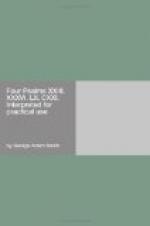Continue Thy leal love unto them that know Thee, And Thy righteousness to the upright of heart. Let not the foot of pride come against me, Nor the hand of the wicked drive me away. There are the workers of iniquity fallen, They are flung down and shall not be able to rise.
Two remarks remain.
A prevailing temper of our own literature makes the method of this Psalm invaluable to us. A large and influential number of our writers have lent themselves, with ability and earnestness, to such an analysis of sin as we find in the first four verses of the Psalm. The inmost lusts and passions of men’s hearts are laid bare with a cool and audacious frankness, and the results are inexorably traced in all their revolting vividness of action and character. I suppose that there has not been a period, at least since the Reformation, which has had the real facts of sin so nakedly and fearfully laid before it. The authors of the process call it Realism. But it is not the sum of the Real, nor anything like it. Those studies of sin and wickedness, which our moral microscopes have laid bare, are but puddles in a Universe, and the Universe is not only Law and Order, but is pervaded by the character of its Maker. God’s mercy still reaches to the heavens, and His faithfulness to the clouds. We must resolutely and with ‘pious obstinacy’ lift our hearts to that, else we perish. I think of one very flagrant tale, in which the selfishness, the lusts and the cruelties of modern men are described with the rarest of power, and so as to reduce the reader to despair, till he realises that the author has emptied the life of which he treats of everything else, except a fair background of nature which is introduced only to exhibit the evil facts in more horrid relief. The author studies sin in a vacuum, an impossible situation. God has been left out, and the conviction of His pardon. Left out are the power of man’s heart to turn, the gift of penitence, the mysterious operations of the Spirit, and the sense of the trustfulness and patience of God with the worst souls of men. These are not less realities than the others; they are within the knowledge of, they bless, every stratum of life in our Christian land; they are the biggest realities in the world to-day. Let us then meet the so-called realism of our times with this Greater Realism. Let us tell men who exhibit sin and wickedness apart from God and from man’s power of penitence, apart from love and from the realised holiness of our human race, that they are working in a vacuum, and their experiment is therefore the most un-real that can be imagined. We may not be able to eliminate the cruel facts of sin from our universe, but do not let us therefore eliminate the rest of the Universe from our study of sin. Let us be true to the Greater Realism.




